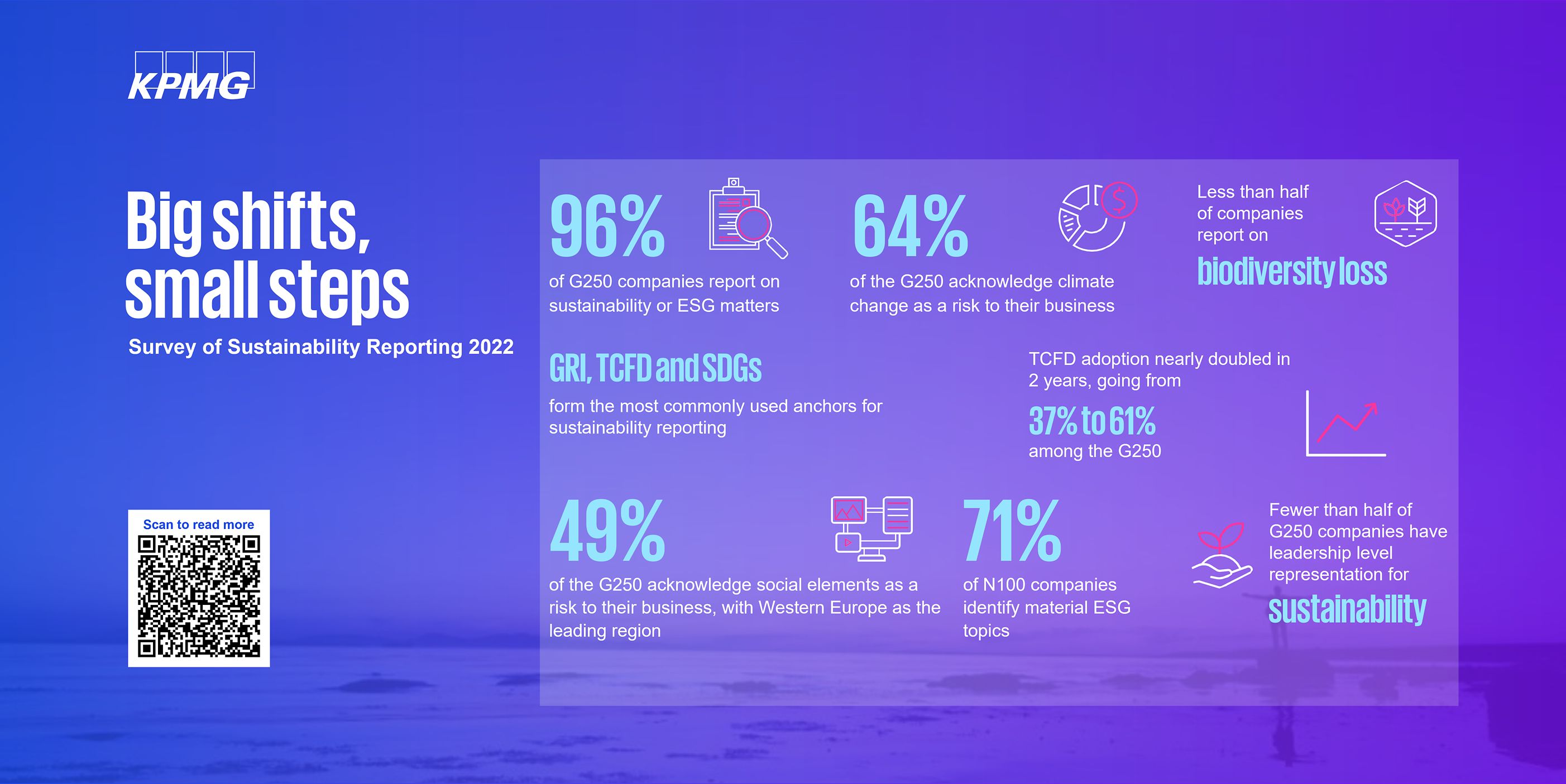Global sustainability reporting by KPMG shows improvement with Asia Pacific region leading in the field
Global sustainability reporting by KPMG shows improvement with Asia Pacific region leading in the field
Global sustainability reporting by KPMG

Global findings
— The latest report from KPMG reveals that sustainability reporting has grown steadily, with 79 percent of leading companies providing sustainability reports
— There has been marked improvements in companies reporting carbon reduction targets, but action remains too slow in key related areas, with less than half of companies currently recognizing biodiversity loss as a risk
— Among the thousands of reports analyzed, less than half of the world’s largest companies are providing reporting on ‘social’ and ‘governance’ components of ESG
— KPMG outlines a series of recommendations, including companies shifting from a narrative-driven approach and making better use of data to drive change and provide evidence of action
First published in 1993, the KPMG Survey of Sustainability Reporting is produced every two years and this year’s edition provides analysis of the sustainability and Environment, Social and Governance (ESG) reports from 5,800 companies across 58 countries and jurisdictions. The findings released today show that there is still a disconnect between the urgency of addressing climate change and social equity, and the ‘hard results’ provided by businesses.
The latest findings reveal that sustainability reporting has grown steadily. The world’s top 250 companies – known as the G250 – are almost all providing some form of sustainability reporting, with 96 percent of this group reporting on sustainability or ESG matters.
Meanwhile, there has been a steady and consistent increase in reporting from the so-called N100 (the top 100 companies in each country or jurisdiction analyzed). Ten years ago, around two-thirds of the N100 group of companies provided sustainability reports. The figure now stands at 79 percent.
Noteworthily, the Asia Pacific region leads in sustainability report, with 89 percent of its companies undertaking sustainability reporting. This is followed by Europe (82 percent), the Americas (74 percent) and the Middle East and Africa (56 percent).

Climate topic continues to dominate
The latest findings reveal that businesses worldwide are increasingly recognizing that they have a role to play in helping to achieve climate targets, with an impressive 71 percent of the N100 and 80 percent of the G250 setting carbon reduction targets. Reassuringly, most companies recognize that they must reduce their own emissions to achieve their carbon targets rather than rely solely on carbon credits.
“Vietnam’s commitment to achieve net-zero carbon emissions by 2050 will require collaboration and action from players across the public and private sector. The Government needs to continue to make changes to the regulatory framework and corporations need to make voluntary commitments to support the Government’s ambition and to drive sustainable values.” said John Ditty, ESG Sponsoring Partner for KPMG Vietnam & Cambodia.
However, the report also reveals some key areas where faster progress is required. Globally, only 64 percent of G250 companies formally acknowledge that climate change is a risk to their business, and less than half of companies currently recognize biodiversity loss as a risk.

Sustainability reporting through the ESG lens
“This year’s report has also highlighted some further challenges the world’s major companies are facing in their reporting on ESG. Among the thousands of reports analyzed, less than half of the world’s largest companies provided reporting on ‘social’ components (e.g. modern slavery; diversity, inclusion and equity; community engagement; and labor issues), despite an increasing awareness of the link between the climate crisis and social inequality. At the same time, less than half of companies disclosed their governance risks (e.g., corruption bribery and anti-corruption, anti-competitive behaviors or political contributions.) In addition, only one third of N100 companies have a dedicated member of their leadership team responsible for sustainability and less than one-quarter of these companies link sustainability to compensation among business leadership” said Nguyen Chi Hieu, Director, ESG Advisory, KPMG Vietnam and Cambodia
ESG disclosures continue to be overwhelmingly narrative-driven, rather than publishing quantitative or financial data regarding impacts. This is clearly an area of improvement for companies around the world.
In Vietnam, the government is progressing with the disclosure requirements for environmental performance. Public companies are required to disclose their environmental and social performance data. While it is still voluntary for other businesses, there is a need for the disclosure of more pertinent quantitative ESG-related quantitative data in the company’s sustainability report. Additionally, there are growing calls for Vietnamese firms to make net-zero promises and promptly take more significant action on carbon reduction in light of Vietnam's recent clear commitments to the UN Climate Change Conference (COP26). For companies that have already started their decarbonization strategy, it is more vital than ever to increase the public awareness and visibility of their sustainability in their reporting. The survey's findings, however, indicate that while the majority of Vietnam's N100 enterprises have published sustainability reports, there is a lack of conformity with established ESG reporting frameworks.
On a positive note, around three-quarters of reporting companies conducted materiality assessments and are disclosing material topics.

A call to action
Expectations relating to Sustainability are driving a different perspective and set of conversations in Boardrooms, driving business leaders to stretch their thinking and ensure that from the top down they are making strategic decisions that take climate and broader ESG considerations more into account.
The pressure on businesses to report on non-financial metrics is only expected to grow as regulations and stakeholder expectations evolve. By acting now, companies can make informed choices to drive the change that is much needed to be a good corporate citizen in today’s world.
About KPMG in Vietnam
KPMG in Vietnam is one of the leading professional services firms, with over 1,600 people working from our offices in Hanoi, Ho Chi Minh City and Da Nang. We work with our colleagues across Asia and around the world to provide a broad range of services.
About KPMG’s Survey of Sustainability Reporting
First published in 1993, this 2022 survey marks the twelfth edition, examining sustainability reporting trends around the world. Over the past two decades, sustainability reporting has been largely voluntary, so the purpose of this survey was to offer meaningful insights about how to improve levels of disclosure by business leaders, sustainability professionals, and company boards.
Today, we are on the precipice of adopting mandatory and regulated sustainability reporting and the reporting landscape is poised to change drastically. The findings in this report reflect on the current state of reporting today, the gaps that should be filled to meet regulatory requirements and the overarching business strategy considerations that can allow companies to meet increasing regulatory expectations while still creating impact and generating value.